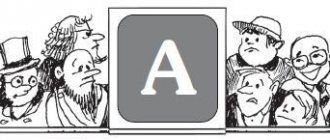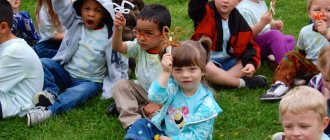12 February 2015 admin Home page » Pedagogy » Proverbs
Folk pedagogical heritage - proverbs and sayings about raising children . They carry a wealth of experience passed on from mouth to mouth. Of course, for us, modern parents, it is extremely useful to become acquainted with the wisdom of our ancestors. This will help to avoid mistakes and raise children in accordance with the cultural traditions of the Russian people. A selection of the most interesting Russian proverbs about education for reflection:
Russian folk and modern proverbs about education
- Baby, like dough: just as you knead it, it grows.
- A living word is more valuable than a dead letter.
- It takes three years to learn good things, but one hour is enough to learn bad things.
- Raising a child is not letting the chicken out.
- A hungry belly is deaf to learning.
- I fed the snake on my neck.
- A child's defects are not born, but nurtured.
- Beatings torment, but do not teach.
- A hole in youth - a hole in old age.
- It is difficult to light a fire from one twig; it is difficult to raise one son.
- A person without education is a body without a soul.
- Learning in childhood is as lasting as engraving on stone.
- The child is like dough: just as you knead it, it grows.
- What you teach a child to do is what you will get from him.
- What was watered, what was fed, grew.
- A person without education is like a body without a soul.
- Things are washed with water, a person is educated with teaching.
- Dunno lies, but know-it-all runs far.
- What goes around comes around.
- It is easier to punish than to educate.
- He who does not control himself will not teach anyone else to reason.
- To teach a fool to carry water with a sieve.
- Managed to give birth, manage to raise.
- Repetition is the mother of learning.
- Going into science means suffering. Without flour there is no science.
- Thanks to the one who put me on my feet; Yes, thanks to the one who gave me the idea.
- Bend so that it bends, and not so that it bursts.
- It's easier to punish, harder to educate.
- Prodding is not education.
- It's not a thing to teach a lesson, but a thing to teach.
- You don't need a scientist, you need a smart one.
- Nurture with affection, not dragging.
- Not everything is carried, you need affection.
- Man is not satisfied with bread alone.
- Intelligence and education are twin brothers.
- Graze to nourish; Don’t graze to get rich.
- Teaching forms the mind, education - morals.
- Who is from whom, is in that.
- School won't teach you, hunting will teach you.
- A true pointer is not a fist, but a caress.
- Educate the older one, and the younger one will learn on his own.
- A kind word is worth more than a club.
- Man was not born for himself.
- You can't buy education and politeness in a shop.
- From the young, like from wax: you can mold whatever you want.
- Capricious in childhood, ugly in old age.
- Trouble will torture you, trouble will also teach you. Whatever he forces himself to do, he will learn.
- A good son is not born, but raised.
- Too many cooks spoil the broth.
- The bird is red in its feathers, and the man is in his learning.
- An obedient son of his fathers is not burdened by orders.
- Written with a pen, you can’t cut it out with an axe.
- An unlearned person is like an unsharpened axe.
- Looking at people, although you don’t grow, you stretch.
- Raising children is not about plucking chickens.
- Not the parent who gave birth, but the one who fed.
- He has a diploma, but doesn’t understand business.
- It is not with a race that one beats a wolf, but with a trick.
- Bend the tree while it bends, teach the child while it obeys.
- Even a stone can be polished, but a person can be educated even more so.
- Teach others and you will learn yourself.
- A good father has good children.
- It's never too early and never too late to learn.
- One good example is better than a hundred words.
- If school doesn't teach you, hunting will teach you.
- It is not the father who gave him drink and nourishment, but the one who taught him wisely.
- What you learn in your youth will be useful in your old age.
- A true pointer is not a fist, but a caress.
- They fight not by force, but by skill.
- Raising children is not enough to count chickens.
- The student and the teacher are judged.
- Let the children go free, you yourself will be in captivity.
- Learn good things, so bad things will not come to mind.
- Every master takes on training, but not every master completes the training.
- Lunch is beautiful with pies, the river with its banks, and the gathering with heads.
- He who knows a lot, asks a lot.
- It’s not the good mother who gave birth, but the one who raised her.
- A full belly is deaf to learning.
- And a blind horse is lucky if a sighted person sits on the cart.
- Whoever does not strengthen his heart will not raise a child.
- He who wants to know a lot needs little sleep.
- You will learn from the smart, and you will unlearn from the stupid.
- Raise your children from childhood.
- Unreasonable guardianship is worse than homelessness.
- It is not the one who knows how to read who is literate, but the one who listens and understands.
- Those who could not take with affection will not take with severity.
- Bend the tree while it bends; Teach the child while he listens.
- They learn both for better and worse from a young age.
- While your son is small, be his teacher; when he grows up - a brother.
- Intelligence has no price, and education has no limit.
- If you knew how to give birth to a child, you also know how to teach it.
- First az and beeches, and then science.
- Without studying you can't weave bast shoes.
- I led her by the hand and got a white hand.
- Not the father who gave birth, but the one who gave him water, fed him and brought him into the people.
- An apple falls not far from the tree.
- Whoever learns from a young age does not know hunger in old age.
- He who is without supervision from the cradle is out of work all his life.
- What you teach a child to do is what you will get from him.
- What Vanya didn’t learn, Ivan won’t learn.
- As you go to bed, you will sleep.
- What goes around comes around.
- Bend the tree while it bends, teach the child while it obeys.
- Teach your son that when he lies across the bench and stretches out lengthwise, it will be difficult.
- That's why the guy fell off his horse because his father sat him down crookedly.
- Punish children with shame, not with a whip.
- A good example is the best sermon.
- Don’t feed him a roll of bread, and don’t hit him with a brick.
- A silent reproach is heavier than what is said.
- Seven nannies have a child without an eye.
- You can't raise a puppy without strictness.
- Let the children have their way, you yourself will be in captivity.
- What is on the mind of an adult is on the tongue of a child.
- A good example is worth a hundred words.
- Parents are hardworking - and children are not lazy.
- Where there is harmony in the family, the children are raised well.
- If you spare the rod, you will spoil the child.
- A good spanking never hurt anyone.
- What is hello is the answer.
- A word to a wise man is worth more than a cudgel.
- You won’t be smart sitting on your mother’s sundress.
- Good covers good.
- There is patience for wanting.
- Whoever indulges children sheds a tear later.
- Whatever the child enjoys, as long as he doesn’t cry.
- When children stand on their heads, parents stand on their ears.
- The best way to make children good is to make them happy.
- Love does not necessarily mean children, but children do mean love.
- Children's questions usually require non-childish answers.
- It's not easy to get children on their feet - especially early in the morning.
- If you were born yourself, help someone else.
- Happy parents are well-rested parents.
- Son! Listen to mom and do as dad said!
- Well-bred children are not a treasure, but a treasure trove of treasures.
Reflection of folk pedagogical culture in oral folk art
The history of pedagogical thought of any nation begins with folk pedagogy: children are always thoughts and remain the object of special attention and care of all peoples of the Earth.
Folklore was one of the most important means of preserving national identity, culture, traditions, and customs. Thanks to oral folk art, the child learned simple but very important information about the phenomena of the outside world, relationships between people; In the process of communication in the family and outside it, children developed a love of work, respect for the land and bread, developed resourcefulness, and the ability to overcome difficulties. However, it should be noted that folk pedagogy was not free from shortcomings caused by the influence of the dominant church ideology, superstitions, patriarchal way of life, etc. In general, despite the fact that in different eras the influence of the folk worldview on the upbringing of children manifested itself in different ways, it has always formed a love for the homeland, for work and the working man.
Folk pedagogy considered the child not only as an object, but also as a subject of education, as evidenced by the children's subculture, expressed in children's games, counting rhymes of a given age, with the help of which children asserted themselves as a community, different from adults in their autonomy and psychological independence.
An integral part of folk pedagogy was folk didactics - content, methods and means of teaching, transferring to children labor, household, agrotechnical skills and abilities, mathematical, medical and other knowledge.
Folk pedagogy found its expression in the specific demonstration of labor operations, in the assimilation of folk signs of the weather, observation of the growth and development of plants, determining the timing of collecting natural treasures (mushrooms, berries, nuts), and writing riddles-tasks that developed logical thinking.
Fairy tales, being artistic and literary works, were at the same time for workers and an area of theoretical generalizations in many branches of knowledge. They are a treasury of folk pedagogy; moreover, many fairy tales are pedagogical works, i.e. they contain pedagogical ideas.
The educational role of fairy tales is great. There is an assertion that the pedagogical significance of fairy tales lies on the emotional and aesthetic plane, but not on the cognitive plane. We cannot agree with this. The very opposition of cognitive activity to emotion is fundamentally wrong: the emotional sphere and cognitive activity are inseparable, without emotion, as we know, knowledge of the truth is impossible.
Fairy tales, especially historical ones, trace interethnic ties between peoples and the joint struggle of workers against foreign enemies and exploiters. A number of fairy tales contain approving statements about neighboring peoples. Many fairy tales describe the journeys of heroes to foreign countries, and in these countries they, as a rule, find helpers and well-wishers; workers of all tribes and countries can agree among themselves; they have common interests. If a fairy-tale hero has to wage a fierce struggle in foreign countries with all kinds of monsters and evil wizards, then usually victory over them entails the liberation of people languishing in the underworld or in the dungeons of monsters. Moreover, those freed hated the monster just as much as the fairy-tale hero, but they did not have the strength to free themselves. And the interests and desires of the liberators and the liberated turned out to be almost the same.
Positive fairy-tale heroes, as a rule, are helped in their difficult struggle not only by people, but also by nature itself: a densely leafed tree hiding fugitives from the enemy, a river and lake that direct the pursuit along the wrong path, birds warning of danger, fish searching and finding a ring dropped into the river and passed on to other human assistants - a cat and a dog; an eagle that lifts the hero to a height inaccessible to man; not to mention the devoted fast horse, etc. All this reflected the age-old optimistic dream of the people to subjugate the forces of nature and force them to serve themselves.
Many folk tales inspire confidence in the triumph of truth, in the victory of good over evil. As a rule, in all fairy tales, the suffering of the positive hero and his friends is transitory, temporary, and they are usually followed by joy, and this joy is the result of struggle, the result of joint efforts. Children especially like the optimism of fairy tales and enhance the educational value of folk pedagogical means.
The fascination of the plot, imagery and fun make fairy tales a very effective pedagogical tool.
A fairy tale is a special, deliciously intriguing genre of literary creativity, which has a phenomenal feature: fairy tales are loved by both young and old, children and adults, the poor and the rich, the stupid and the smart, and vice versa...
Fairy tales are divided into two types: folk tales (or, as abstruse philologists call them, folk tales) and author's tales, that is, literary tales written by a specific writer-storyteller. Let's try to look at the fairy tale from the people's side and from the author's side. So, what do philologists’ textbooks say about folk tales and fairy tales:
1. Folk tales
A folk tale is an epic genre of written and oral folk art: a prosaic oral story about fictional events in the folklore of different peoples. A type of narrative, mainly prosaic folklore (fairy-tale prose), which includes works of different genres, the texts of which are based on fiction. Fairytale folklore is opposed to “reliable” folklore narration (non-fairytale prose).
2. Author's fairy tales
A literary fairy tale is an epic genre: a fiction-oriented work that is closely related to a folk tale, but, unlike it, belongs to a specific author, did not exist in oral form before publication and had no variants. A literary fairy tale either imitates a folk tale (a literary fairy tale written in a folk poetic style) or creates a didactic work based on non-folklore plots. The folk tale historically precedes the literary one.
And the best thing is not to study fairy tales, but to read the fairy tale and enjoy the fairy tale!





